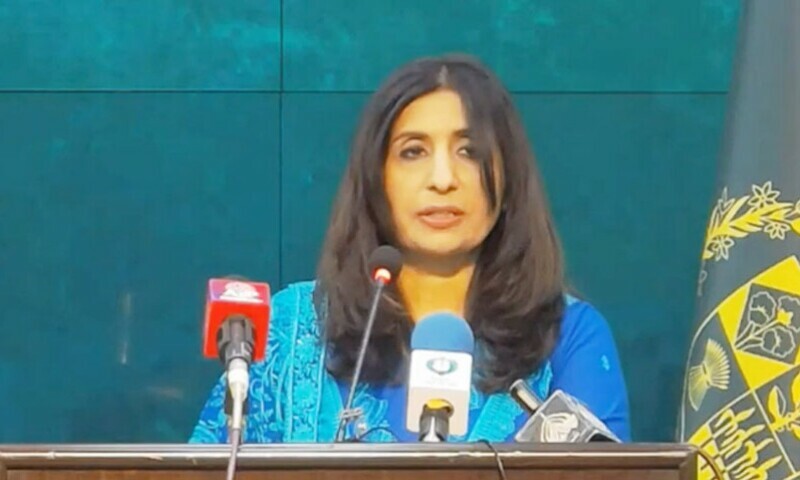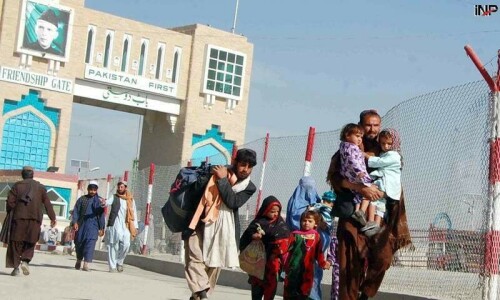Interim Foreign Minister Jalil Abbas Jilani on Thursday met Afghan counterpart Amir Khan Muttaqi in Tibet and discussed the challenges confronting regional peace and stability.
FM Jilani is in China on a two-day visit to participate in the third Trans-Himalayan Forum for International Cooperation, being held in Nyingchi, Tibet autonomous region, from October 4-5.
The Trans-Himalaya Forum, established in 2018, aims to foster enhanced collaboration among regional nations on geographical connectivity, environmental conservation, ecological preservation, and the strengthening of cultural ties.
According to a statement released by the Foreign Office on X today, Jilani held a meeting with Afghan Foreign Minister Muttaqi and reaffirmed Pakistan’s commitment to further strengthen bilateral ties with Afghanistan.
He also underscored that challenges confronting regional peace and stability should be addressed in a “collaborative spirit through collective strategies”.
The meeting comes two days after Pakistan gave an ultimatum to all undocumented immigrants, including Afghan nationals, to leave Pakistan by October 31, or risk imprisonment and deportation to their respective countries.
The decision was taken in an apex committee meeting headed by Prime Minister Anwaarul Haq Kakar and attended by the army chief, among others. The committee also decided that movement across the border would be subject to passports and visas, while electronic Afghan identity cards (or e-tazkiras) would only be accepted until Oct 31.
After the passage of the deadline, the authorities will kickstart an operation targeting illegal properties and businesses owned by immigrants or those being run in collaboration with Pakistani nationals.
The move had drawn a response from Afghan authorities, with Afghan Taliban spokesman Zabihullah Mujahid terming it “unacceptable” while urging authorities to revisit the policy.
Also, at least two people were killed and a child sustained injuries a day earlier when an Afghan sentry opened fire on pedestrians at the Pak-Afghan Chaman Border in Balochistan.
Drive against illegal immigrants not targeted at any particular nationality: FO
Separately, in a weekly press briefing in Islamabad earlier today, FO Spokesperson Mumtaz Zahra Baloch said the ongoing operation against illegal immigrants in the country was not targeted at any particular nationality, according to state-run Radio Pakistan.

She said the ongoing action envisaged repatriating those individuals who had either overstayed their visas or did not have the valid documents to stay. She said Pakistan was within the parameters of its sovereign domestic laws to take action in this context, Radio Pakistan said.
She clarified that the operation did not have anything to do with the 1.4 million Afghan refugees that Pakistan “has been hosting since decades with exemplary generosity and hospitality despite its own constrained economic situation”, the report said.
The spokesperson said Pakistan’s national policy on Afghan refugees remained unchanged and their safe and honourable repatriation was a separate matter for which it continued to engage with Afghanistan to create a conducive environment for their safe return.
Ultimatum to illegal foreigners poses historic dilemma
With the deadline looming, federal and provincial authorities are scrambling to put together a viable plan to undertake what could safely be described as one of the biggest deportation operations in modern times.
The short deadline has caused ripples in the Afghan community across the country, more than half of whom reside in KP, including the merged tribal districts.
Background interviews with officials involved in the process revealed that authorities were struggling to put together a plan to repatriate an unspecified number of illegal immigrants, mostly Afghans.
“This is a huge undertaking,” an official acknowledged. “Cracking down on and rounding up over a million or two illegal immigrants, holding them in detention facilities, feeding them and transporting them to the border or arranging for them to fly out of Pakistan would require a logistical plan and resources, human as well as financial,” the official said, requesting not to be named. “And this is what we are working on at the moment.”
No one within the government actually has any idea of the number of illegal immigrants in Pakistan. “The figures we have are estimates,” a senior official looking after the subject in Islamabad told Dawn by phone. “When we say there are 1.7 million undocumented Afghans, it is just an assessment,” he said.
According to the UNHCR, the UN refugee agency, there are 2.18m documented Afghan refugees in Pakistan. This includes the 1.3m refugees holding Proof of Registration (POR) cards as per the census done in 2006-07, as well as an additional 880,000 refugees granted Afghan Citizens Cards (ACCs) in 2017 following a registration drive in 2017.
The collapse of the Afghan Republic and the return of the Afghan Taliban in August 2021 brought a new influx of roughly 600,000 to 800,000 Afghans to Pakistan, according to government officials. Some of these Afghan nationals had valid visas but are now overstaying.
In between the three categories are an unspecified number of illegal immigrants from Afghanistan. “This number could be anything north of one million,” the official said. “This is a major concern both from security as well as social and economic standpoint.”
“The problem is that the repatriation of Afghan refugees has long been on the agenda, particularly after the unveiling of the National Action Plan (NAP) in December 2014. Plans were made and strategies firmed up, but no serious effort was made to prepare a workable logistical plan backed up by human and financial resources,” the official said.
Officials say there appears to be some seriousness now to address this long-pestering issue. “There is a realisation. It is getting the attention that it deserves, but what we need is a proper plan,” said another official. “And this is what we are working now.”
The only tangible outcome of the NAP on the repatriation of Afghan refugees, say these officials, was the second registration of undocumented Afghans that resulted in granting them the ACCs in 2017. “Nothing was done of the repatriation front after that,” an official said.
Officials say any plan to undertake a repatriation of undocumented foreigners of this scale should involve mapping, sensitisation, logistics and mobilisation of human and monetary resources. “This is the biggest challenge right now,” another official said.
Pakistan is not a signatory to the 1951 Refugee Convention nor the 1967 protocol, but officials say that while they are committed to looking after refugees holding POR and ACCs, the presence of millions of refugees, including the undocumented ones, is now posing several national security issues. “This is the need of the hour, but we must do it properly,” an official said.
But the most critical of all, the “legally illegal”, as one official put it, is the status of hundreds of thousands of Afghans who fled to Pakistan after the collapse of the Ashraf Ghani administration. Among them are former servicemen, human rights activists, singers and musicians and others. Many of them have come with valid visas, and many others just crossed over into Pakistan without any travel documents.
While many of them lie low, thousands of others, according to the UNHCR, have approached them for asylum or seek settlement in a third country. The screening process done by the UN agency in partnership with the Islamabad-based NGO Society for Human Rights and Prisoners’ Aid (SHARP) is painfully slow, involving data collection and in-person interviews of the families and their settlement according to the settlement quota of third countries.
Government officials say the process was not only slow, but the success rate of individuals seeking settlement was less than 5 per cent, meaning that most of the new arrivals in Pakistan might not meet the standard requirement and end up becoming illegal immigrants as well.
The “thousands” of new arrivals who have approached the UNHCR so far are technically and legally under the international body’s protection. But this leaves hundreds of thousands of others who are waiting for their turn to be registered and screened. Their fate is in limbo.
“Pakistan has remained a generous refugee host for decades. The UNHCR acknowledges and appreciates this hospitality and generosity,” Qaisar Afridi, UNHCR’s spokesman in Islamabad, said.
“Any refugee return must be voluntary and without any pressure to ensure protection for those seeking safety,” he said. “Pakistan needs to show compassion for the most vulnerable.”













































Dear visitor, the comments section is undergoing an overhaul and will return soon.